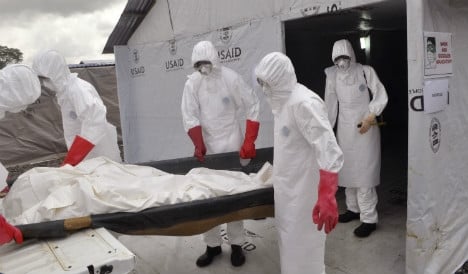VIRUS
Sweden wins lead role in Europe’s Ebola fight
Swedish researchers are spearheading two out of eight Ebola research projects launched on Friday by the European Union’s Innovative Medicines Initiative.
Published: 17 January 2015 09:24 CET

Health workers wearing Ebola protective gear remove the body of a man suspected to have died of the virus in Liberia. AP Photo/ Abbas Dulleh
Gothenburg’s Sahlgrenska Academy has been tasked with investigating one of the three most promising vaccines for deadly hemorrhagic virus, while the Public Health Agency of Sweden is leading the development an easy diagnostic test for the virus, alongside Stockholm University.
Ali Harandi, the Sahlgrenska researcher who is leading trials on the VSV-ZEBOV vaccine, said his project’s €3.9 million share of the Ebola project’s total €215m budget would speed up research by enabling his team to deploy cutting edge techniques.
“The World Health Organisation has identified VSV-ZEBOV as one of the three most promising Ebola vaccine candidates, and clinical trials are already underway in Europe and Africa,” he said. “The EU-IMI investment enables us to harness the power of the cutting edge genomics technologies along with the state-of-the-art immunological read-outs.”
This, he said, would bring detailed new information on how the human immune system reacted to the vaccine.
The World Health Organisation estimates that some 21,296 people have contracted the deadly virus in West Africa since the epidemic broke out there in December 2013, of whom
around 8,500 have died.
The Innovative Medicines Initiative (IMI) is a partnership between the European Union and the European Federation of Pharmaceutical Industries and Associations, a pharmaceutical trade body.
The Sahlgrenska team is working with Italy's Sclavo Vaccines Organisation and other researchers in the UK, Germany, The Netherlands, Italy, and the US. The Public Health Agency is working with researchers in Germany, Italy, Belgium, France, Finland, and Senegal.
Url copied to clipboard!


 Please whitelist us to continue reading.
Please whitelist us to continue reading.
Member comments